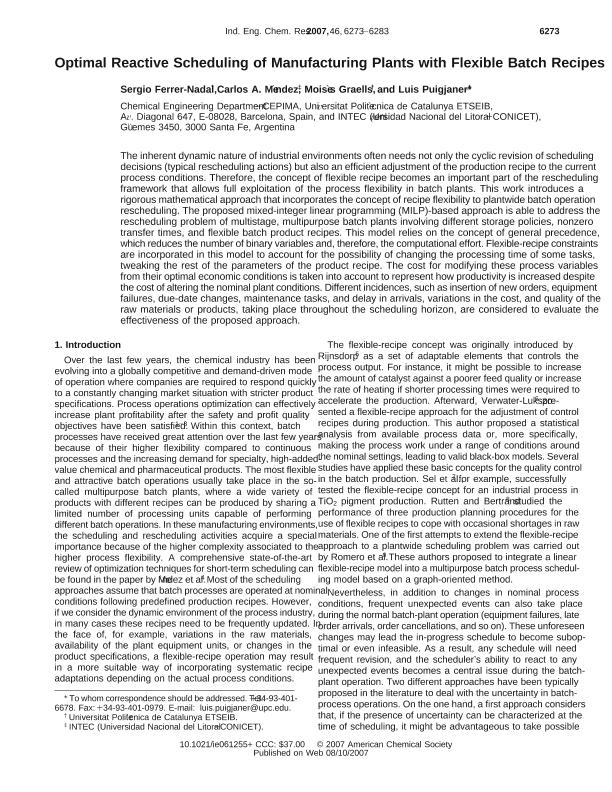Mostrar el registro sencillo del ítem
dc.contributor.author
Ferrer Nadal, S.
dc.contributor.author
Mendez, Carlos Alberto

dc.contributor.author
Graells, Moisès
dc.contributor.author
Puigjaner, L.
dc.date.available
2017-08-22T20:25:57Z
dc.date.issued
2007-12
dc.identifier.citation
Ferrer Nadal, S.; Mendez, Carlos Alberto; Graells, Moisès; Puigjaner, L.; Optimal reactive scheduling of manufacturing plants with flexible batch recipes; American Chemical Society; Industrial & Engineering Chemical Research; 46; 19; 12-2007; 6273-6283
dc.identifier.issn
0888-5885
dc.identifier.uri
http://hdl.handle.net/11336/22814
dc.description.abstract
The inherent dynamic nature of industrial environments often needs not only the cyclic revision of scheduling decisions (typical rescheduling actions) but also an efficient adjustment of the production recipe to the current process conditions. Therefore, the concept of flexible recipe becomes an important part of the rescheduling framework that allows full exploitation of the process flexibility in batch plants. This work introduces a rigorous mathematical approach that incorporates the concept of recipe flexibility to plant-wide batch operation rescheduling. The proposed MILP-based approach is able to address the rescheduling problem of multistage multipurpose batch plants involving different storage policies, non-zero transfer times and flexible batch product recipes. This model relies on the concept of general precedence which reduces the number of binary variables and so the computational effort. Flexible recipe constraints are incorporated in this model to account for the possibility of changing the processing time of some tasks tweaking the rest of the parameters of the product recipe. The cost for modifying these process variables from their optimal economic conditions is taken into account to represent how productivity is increased despite the cost of altering the nominal plant conditions. Different incidences such as insertion of new orders, equipment failures, due-date changes, maintenance tasks, delay in arrivals, variations in the cost and quality of the raw materials or products, taking place throughout the scheduling horizon are considered to evaluate the effectiveness of the proposed approach.
dc.format
application/pdf
dc.language.iso
eng
dc.publisher
American Chemical Society

dc.rights
info:eu-repo/semantics/openAccess
dc.rights.uri
https://creativecommons.org/licenses/by-nc-sa/2.5/ar/
dc.subject
Scheduling
dc.subject
Flexible Recipes
dc.subject.classification
Otras Ingeniería Química

dc.subject.classification
Ingeniería Química

dc.subject.classification
INGENIERÍAS Y TECNOLOGÍAS

dc.title
Optimal reactive scheduling of manufacturing plants with flexible batch recipes
dc.type
info:eu-repo/semantics/article
dc.type
info:ar-repo/semantics/artículo
dc.type
info:eu-repo/semantics/publishedVersion
dc.date.updated
2017-08-04T15:49:45Z
dc.journal.volume
46
dc.journal.number
19
dc.journal.pagination
6273-6283
dc.journal.pais
Estados Unidos

dc.journal.ciudad
Columbus
dc.description.fil
Fil: Ferrer Nadal, S.. Universidad Politecnica de Catalunya; España
dc.description.fil
Fil: Mendez, Carlos Alberto. Consejo Nacional de Investigaciones Científicas y Técnicas. Centro Científico Tecnológico Conicet - Santa Fe. Instituto de Desarrollo Tecnológico para la Industria Química. Universidad Nacional del Litoral. Instituto de Desarrollo Tecnológico para la Industria Química; Argentina
dc.description.fil
Fil: Graells, Moisès. Universidad Politecnica de Catalunya; España
dc.description.fil
Fil: Puigjaner, L.. Universidad Politecnica de Catalunya; España
dc.journal.title
Industrial & Engineering Chemical Research

dc.relation.alternativeid
info:eu-repo/semantics/altIdentifier/doi/http://dx.doi.org/10.1021/ie061255
dc.relation.alternativeid
info:eu-repo/semantics/altIdentifier/url/http://pubs.acs.org/doi/abs/10.1021/ie061255%2B
Archivos asociados
